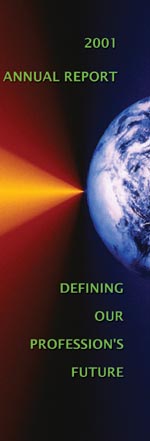 Defining Our Profession's Future
Defining Our Profession's Future
July 1, 2000 – June 30, 2001
Dedicated to the Legal Profession and Justice
System
Fiscal year 2001 (FY01) was defined largely by
the efforts of President Gary Bakke and members statewide to discuss and
debate the future of the profession. "Seize the Future" is the title of
a series of events that focused on the sweeping changes affecting the
delivery of legal services to the public. The
initiative began with a conference in Madison, and led into a 10-part
Seize the Future Resolution to address specific issues, including
multidisciplinary practice (MDP), the unauthorized practice of law, and
unbundling of legal services. The resolution was disseminated to the
membership at large and was debated among the Board of Governors.
At the Board of Governor's request, the State Bar organized 16
roundtables statewide in spring 2001 to gather input from members.
Hundreds of attorneys turned out to learn about the issues and to be
heard. Member input greatly impacted the course of the resolution, which
was amended and approved at the board's final meeting in May. Among
other things, the revised resolution calls for a formal study commission
for MDP. The commission will research the impact of multidisciplinary
practices on the legal profession and the public, make recommendations
in support of or in opposition to MDP, and host hearings on its outcome
during FY02. Commission membership will include approximately 25 lawyers
and nonlawyers who share different opinions on the benefits and harms of
MDPs to the legal profession and the public. For more information, see
the Seize
the Future homepage.
The State Bar of Wisconsin is dedicated to advancing the legal
profession and improving the justice system. Each year, the State Bar
offers hundreds of educational opportunities for members; engages in
cutting-edge research about the justice system; provides effective means
for members to communicate and network; advocates on behalf of the
profession in the state Legislature, Congress, and with the Wisconsin
Supreme Court; and sponsors an array of public education and service
programs. In this annual report, FY01 activities are organized under
five categories that describe the nature of the Bar's work on behalf of
the 20,000-plus members and the public: education, research, knowledge
exchange, advocacy, and public service. Due to space constraints, this
report contains only a small sampling of the organization's many
activities.
Education
The State Bar provides a variety of
educational opportunities for members through continuing legal education
seminars and books, convention programs, committee and section
involvement, and the Wisconsin Lawyer magazine, among others.
CLE Seminars. In FY01, State Bar CLE
collaborated with numerous State Bar sections, committees, other legal
organizations, and interdisciplinary professional groups to produce more
than 60 individual seminars, resulting in 70 live presentations and more
than 450 video presentations. The 520-plus program dates and locations
served more than 13,000 individuals.
Web-enhanced CLE. State Bar CLE made history in FY01 with its first
Web-enhanced CLE program. The two-hour program, "Wisconsin Resources on
the Internet," drew 60 State Bar resident and nonresident members.
Participants "attend" a Web-enhanced seminar from the location of
choice - home or office. The speaker's voice arrives over the telephone
for reliable, clear, and uninterrupted sound quality. The visual
information is delivered via the Internet on a desktop PC. Speakers
enhance their presentations by adding live, real-time Web site examples,
PowerPoint slides, and a variety of other written and visual
materials.
The program, a partnership of the State Bar and the Law Librarians
Association of Wisconsin, earned an award from the American Association
of Law Libraries for "Excellence in Marketing."
While the convenience of this technology is unmistakable, the
challenge is to make CLE programs affordable and usable for all State
Bar members.
CLE Books. CLE Books continued to provide
top-notch legal resources to attorneys, with the invaluable help of
hundreds of volunteer authors who contributed their time and expertise.
FY01 proved to be a busy year, producing the following:
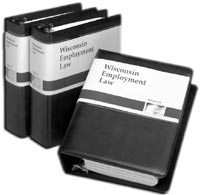
- 18 books were supplemented, including the three-volume Wisconsin
Employment Law;
- 18 titles were completely revised, including: A Guide for
Wisconsin Nonprofit Organizations, all five volumes of the popular
Wisconsin Judicial Benchbook series, The Law of Damages in
Wisconsin, and System Book for Family Law in Wisconsin;
and
- two new titles, The New Wisconsin Rules of Appellate Procedure
2001 and Professional Discipline of Wisconsin Attorneys: A
Compendium, copublished with the Wisconsin Supreme Court's Office
of Lawyer Regulation.
Major projects underway for FY02 include revisions of Marital
Property Law in Wisconsin and Traffic Law and Practice in
Wisconsin.
Research
Research on the legal profession took many shapes at the Bar during
FY01, including querying members about the image of the profession,
conducting public focus groups about trust and confidence in the justice
system, and surveying members about the economics of practicing law. In
addition, the Bar conducts an ongoing assessment of its products and
services, including conducting a member needs assessment every three
years, mailing 60-second surveys and holding focus groups to generate
input on specific CLE seminars and books, and mailing product/order
feedback cards with each product shipment.
Public Image of the Profession. In surveys, focus
groups, and roundtable discussions, members have asked the State Bar to
"do more" to enhance the image of the profession. As a result, in FY01
the State Bar embarked on a long-range image campaign that involves
developing positive public messages about the legal profession. The
State Bar reviewed national research, conducted statewide public phone
surveys, and organized focus groups with members in Madison, Milwaukee,
and La Crosse to collect substantial data on the image of the
profession. In FY02, the State Bar will work with a member oversight
committee to formulate positive messages about the profession to enhance
our existing public relations efforts. The campaign - an ongoing
initiative dedicated to enhancing the image of lawyers by increasing the
public's understanding of the profession - will help focus all of our
external communications around a central theme.
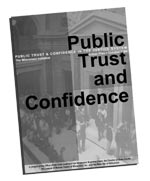 Public Trust and Confidence. The Public Trust &
Confidence Committee - a partnership of the State Bar, the Office of the
Chief Justice, the Director of State Courts, and the Wisconsin League of
Women Voters - issued an action plan in FY01 outlining strategies to
improve the justice system and promote public trust. The action plan
shapes existing efforts of the State Bar, the courts, law enforcement
agencies, and community groups. The committee recommended five actions:
provide equal treatment in the justice system; encourage
judicial/attorney involvement in the community; enhance satisfaction
with the juvenile justice system; increase empathy in the justice
system; and improve the selection and treatment of jurors.
Public Trust and Confidence. The Public Trust &
Confidence Committee - a partnership of the State Bar, the Office of the
Chief Justice, the Director of State Courts, and the Wisconsin League of
Women Voters - issued an action plan in FY01 outlining strategies to
improve the justice system and promote public trust. The action plan
shapes existing efforts of the State Bar, the courts, law enforcement
agencies, and community groups. The committee recommended five actions:
provide equal treatment in the justice system; encourage
judicial/attorney involvement in the community; enhance satisfaction
with the juvenile justice system; increase empathy in the justice
system; and improve the selection and treatment of jurors.
This committee reviewed the wealth of national and local research
concerning issues of public trust and confidence. Using this research
and the committee members' personal experience with Wisconsin's justice
system, the committee developed a list of issues that create barriers to
public trust and confidence.
In addition, the committee hosted five statewide focus groups,
soliciting input from three groups of individuals who had recent
encounters with the system (former offenders and their families, civil
litigants, and jurors) and two groups comprised of randomly selected
people.
The State Bar supports bringing together leaders of the judiciary,
the legal profession, law enforcement, local government, and community
groups to discuss the plan's implementation. Planning will get underway
in fall 2001.
Economics of Practice Survey. At the end of FY01,
the State Bar developed its third Economics of Law Practice Survey, a
direct result of the hundreds of inquiries received annually from
members for up-to-date information on law firm economics. The survey
results, available this fall, assist lawyers in measuring their ability
to provide cost-effective legal services and gathering information to
react to the public's perception about attorney income and overhead. The
survey covers law firm economic issues such as: billing practices, time
spent on billable and nonbillable activities, attorney hourly rates,
overhead expenses, and salary information for associates, legal
assistants, and legal secretaries.
Knowledge Exchange
The State Bar, as directed by the Wisconsin Supreme Court, provides a
forum for exchanging information about the legal profession. The State
Bar accomplishes this by hosting hundreds of seminars and meetings
annually, organizing an annual gathering of the members, creating
committees to address contemporary issues such as enhancing diversity,
and producing a host of legal publications, including a monthly magazine
that features cutting-edge legal issues and trends. The State Bar also
uses its Internet site, WisBar, in a variety of ways to facilitate
communication between members. Thousands of members participate in
electronic mailing lists on topics specific to their interests.
Convention. More than 700 members attended the CLE
programs and social functions at the 2001 State Bar Annual Convention in
Lake Geneva in May, where Madison attorney Gerry Mowris was sworn in as
the 46th State Bar president.
"Lawyers don't have a great public image," said Mowris. "We need to
get back the public trust and confidence so we can effectively do the
job of the third branch of government. I am committed to working with
the courts and the public toward improving that trust and confidence. We
need to educate the public about what we do." Mowris also vowed to
support efforts begun by Gary Bakke and the Executive Committee under
the Seize the Future initiative. A highlight of the convention was the
presidential showcase program on DNA evidence and the broader issue of
problems in our justice system, sponsored by the Individual Rights &
Responsibilities and Criminal Law sections. Nationally acclaimed DNA
evidence expert Peter Neufeld, coauthor of Actual Innocence, led a panel
discussion on the growing recognition that persons charged with crimes,
whether pretrial or post-conviction, should have access to available
scientific and forensic tools to determine innocence.
Committees, Sections, Divisions. Members exchange
information to improve the practice of law and their personal lives
through the work of 25 sections, three divisions, and 36 committees. As
only one example of the diversity of the work these groups undertake,
the Professionalism Committee took on the task of identifying the
profession's core values, which will be used as a basis for future
discussions on multidisciplinary practice, multijurisdictional practice,
and other future of the profession topics. The committee identified
three core values unique to the legal profession: respect for the rule
of law, maintenance and advancement of the integrity of the legal
system, and ethical representation of and service to clients.
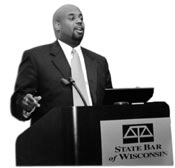 |
|
Assistant District Attorney Derek Mosley acted out a sentencing
hearing based on an actual case involving homicide by intoxicated use of
a motor vehicle as part of the third annual Courts and the Media seminar
in Milwaukee.
|
Courts and the Media. Bringing together various
players in the justice system to better understand each other's roles,
more than 75 circuit court judges, justices, and journalists
participated in a lively debate about the justice system at the third
annual Courts and the Media seminar, presented by the State Bar's
Media-Law Relations Committee and the Wisconsin Supreme Court.
Reporters sentenced a defendant based solely upon a news story about
an actual case involving homicide by a motor vehicle while intoxicated.
Then a group of judges and attorneys acted out a sentencing hearing
based upon the information presented in the presentence report and the
actual hearing. Reporters' sentences were far more lenient after knowing
all the facts. Media representatives shared their sentences with the
judges, who suggested headlines based on the sentences.
Diversity Initiatives. One of the great outcomes of
members volunteering time and sharing expertise is the development of
successful programs aimed at diversifying the profession to better
reflect society. One of the most successful of these efforts is the
summer minority clerkship program. In FY01, 21 first-year law students
from Marquette University Law School and the U.W. Law School were placed
in law firms, corporate legal departments, and government agencies for
10 to 12 weeks. The program offers a rare opportunity to develop
real-world legal experience after only one year of law school course
work.
Now in its eighth year, the Committee to Encourage the Placement of
Minority Lawyers, which coordinates the clerkship program, has given
more than 100 students practical exposure to legal environments, while
enabling participating employers to promote diversity in their
organizations.
Electronic Communication. In response to the growing
use of technology to disseminate information and facilitate
communication, the State Bar manages nearly 60 electronic mailing lists
to support the work of various entities and encourage lawyer-to-lawyer
dialog. Email list subscribers send or receive information or advice on
matters of common interest. More than 3,300 members subscribe to CaseLaw
Express, a popular free service that emails weekly Wisconsin Supreme
Court and Court of Appeals decisions. Other special interest groups,
like the Solo and Small Firm Committee and the Family Law Section,
sponsor lists for attorneys working in smaller firms or environments, or
practicing family law. Questions unique to these groups are quickly
answered.
Wisconsin Supreme Court. The State Bar plays an
important role in advising the courts on issues affecting the practice
of law, from changes to the lawyer regulation system to initiatives for
improving the delivery of services to the public. As one example, the
State Bar testified at a public hearing on a petition to create a
mandatory fee arbitration system for lawyer-client fee disputes, which
was opposed by the Board of Governors. The court called for a study on
the need for mandatory fee arbitration in Wisconsin.
Advocacy
Many of the State Bar's activities fall under the umbrella of
advocating for the integrity and effectiveness of the legal profession.
The State Bar's government relations and grassroots program is at the
forefront of these efforts, relying heavily upon its network of
volunteer lawyers statewide.
Lawyers Legislative Action Network. This grassroots
program, which is designed to keep members informed and involved with
legislative developments, numbers more than 800 and continues to grow.
The network continued to be a moving force behind the success of the
State Bar in the State Capitol, and its members play an important role
in positively affecting the legislative process.
Legislative Successes. In January 2001, the state
Legislature began its new biennial session. The State Bar and its
practice sections continue to be heavily involved with a variety of
issues pending before the Legislature, including provisions in the
state's biennial budget bill, and separately introduced legislation.
The first year of the legislative biennium typically is consumed by
action on the biennial budget bill and FY01 has been no different; in
the first six months of 2001 only 10 bills were signed into law. Due to
the volunteer efforts of LLAN grassroots members and lawyers statewide,
the State Bar successfully saw one of its bills among the 10 signed into
law. The legislation was UCC Revised Article 9, supported by the State
Bar and its Business Law Section.
While urging legislators to act quickly on issues such as Revised
Article 9, the State Bar simultaneously was involved in a multitude of
provisions in the biennial budget bill, such as funding for the State
Public Defender, establishing a court interpreter program, and state
funding for civil legal services to low-income individuals.
Additionally, the State Bar has been able to see other provisions -
reasonable fees for obtaining photocopies of medical records, supported
by the State Bar and a priority for the Litigation Law Section;
revisions to Wisconsin's corporations, supported by the Business Law
Section; language and funding to maintain percentage expressed orders
where appropriate, supported by the Family Law Section; and the use of
DNA evidence, supported by the Criminal Law Section - included at
various stages of the budget process.
Public Service
The State Bar is committed to educating the public about the legal
system and helping serve the public's legal needs. The State Bar reaches
out through numerous law-related education activities, consumer
publications, grants, and Internet legal resources.
LegalExplorer and Lawyer Referral. With the launch
of LegalExplorer.com at the
beginning of FY01, the State Bar became one of the first bar
associations in the country to produce a comprehensive, public-focused
legal Web site. The Web site has already reached thousands of
consumers.
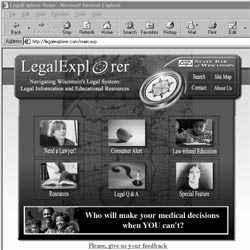 LegalExplorer offers consumers a starting point for resolving
a legal issue; provides answers to frequently asked questions; alerts
and educates the public about consumer news; allows consumers to search
a database of State Bar publications, videotapes, and programs; and
exposes educators and students to law-related education.
LegalExplorer offers consumers a starting point for resolving
a legal issue; provides answers to frequently asked questions; alerts
and educates the public about consumer news; allows consumers to search
a database of State Bar publications, videotapes, and programs; and
exposes educators and students to law-related education.
LegalExplorer also has enabled the State Bar's Lawyer Referral and
Information Service (LRIS) to greatly expand its reach beyond telephone
referrals. After nearly a year's experience, approximately 30 percent of
the LRIS referrals are coming from LegalExplorer. The Web site's
existence has not decreased the number of phone calls to the service,
which remained at more than 50,000. Internet users access the LRIS
database through LegalExplorer and receive referrals by typing in a
legal practice area and the geographic location where the legal services
are required. As with LRIS's telephone referral service, online
referrals are made on an impartial, county-by-county rotation basis.
LRIS continued throughout FY01 to provide qualified, prescreened
telephone referrals. Experienced legal assistants screen calls and refer
only one in six callers to an LRIS panel attorney; the remaining callers
are given necessary information or referred to a community agency or
other legal resource.
LRIS's sophisticated computer system helps ensure an accurate
attorney-client match using detailed information provided by panel
members. A statewide publicity effort, including Yellow Pages
advertising, brochures, and Internet publicity, gets the word out about
LRIS's direct link to panel members' services.
Legal services statewide planning. In FY01, the Legal Services
Corporation (LSC) asked the State Bar to participate as a stakeholder in
a statewide planning effort to reconfigure and possibly merge
Wisconsin's four federally funded agencies: Legal Action of Wisconsin,
Western Wisconsin Legal Services, Legal Services of Northeastern
Wisconsin, and Wisconsin Judicare. The Board of Governors unanimously
approved further study of the Legal Services Planning Group
recommendations for the future of Wisconsin's legal services programs by
the Finance, Legal Assistance, and Strategic Planning committees.
Pro Bono. As part of its commitment to providing
legal services to low-income citizens, the State Bar has fielded Team
Pro Bono. Team volunteers provide free or reduced cost legal services to
prescreened clients, advise lawyers who provide direct legal services to
clients, organize pro bono projects and motivate team members, and
contribute financial assistance.
In FY01, nearly 130 attorneys attended the first-ever "Future of Pro
Bono: Mandatory Reporting? Voluntary Service?" conference sponsored by
the Legal Assistance Committee. The free conference included a plenary
session addressing the pros and cons of mandatory pro bono reporting in
Wisconsin, as well as breakout sessions covering technology in legal
services delivery, pro bono volunteer recruiting, courthouse pro se
centers, and tips from experts involved in Wisconsin's legal services
delivery system.
Peer Mediation. Educators from 20 elementary schools
statewide learned about peer mediation and ways to teach it at the
annual PEACE (Peers in Education Addressing Conflict Effectively)
program during FY01. Two days of intensive workshops were cosponsored by
the State Bar, the Office of the Attorney General, and the Wisconsin Law
Foundation. Now in its fifth year, the PEACE program helps reduce
violence in Wisconsin elementary schools by teaching children
communication and problem-solving skills.
Approximately 23,870 Wisconsin elementary school students currently
participate in the PEACE program, which includes pairing teachers with
attorneys in their communities to serve as consultants.
Mock Trial Tournament. The State Bar of Wisconsin
High School Mock Trial Tournament attracted 600-plus attorneys and
judges statewide who volunteered their time and expertise to make the
FY01 program a success. In addition to attorneys and judges, more than
150 teachers and 28 regional coordinators helped organize the
tournament, made up of 173 teams. The number of teams has more than
doubled since its inception in 1983.
The two teams that compete in state finals argue a fictional mock
trial case - written by the State Bar's Law-related Education Committee
- before five Wisconsin Supreme Court justices. Mock trial sponsors
include the State Bar's Environmental Law Section, Wisconsin Trust
Account Foundation, Legal Auxiliary of Wisconsin, Wisconsin Association
of School Boards, Wisconsin Law Foundation, and individual attorneys and
citizens.
Teaching Institute. In February 2001, 30 high school
teachers participated in the second annual Wisconsin Justice Teaching
Institute. Assisted by supreme court justices, circuit court judges,
attorneys, and university professors, the teachers took part in a
sentencing exercise, analyzed actual supreme court petitions for review
to determine whether they had been granted or denied, learned how to
pick "teachable" appellate court cases, heard a panel discussion on
judicial independence, and much more. A new book, Connecting to the
Courts: A Teacher's Guide to the Wisconsin Courts, and the "Teaching
about Wisconsin Courts" Web site were unveiled. These new resources
provide valuable materials for teaching about the courts and the law.
The institute is a partnership between the State Bar's Law-related
Education Committee, the Wisconsin Supreme Court, and the U.W.
Department of Curriculum and Instruction.
Project Citizen. During FY01, the State Bar
cosponsored the "We the People, Project Citizen" competition - a
hands-on civic education program for middle school students to promote
competent and responsible participation in state and local
government.
The competition attracted 10 teams statewide to the State Bar Center
for a day of judging. A panel of seven judges - state legislators,
government leaders, and marketing professionals - scored the entries.
Project Citizen was sponsored by the Wisconsin Law Foundation, the State
Bar of Wisconsin, the Center for Civic Education, the National
Conference of State Legislatures, and the U.S. Department of
Education.
We the People ... The Citizen and the Constitution.
In FY01, the State Bar's Law-related Education Committee took over the
administrative responsibility for the "We the People ... The Citizen and
the Constitution" program. In existence since 1987, We the People is a
national program directed by the Center for Civic Education and funded
by the U.S. Department of Education. Based on curriculum designed to
promote a deeper understanding of the Constitution and the Bill of
Rights, the goal is to promote civic competence and responsibility among
elementary and secondary students.
In addition to numerous Wisconsin schools using the We the People
material, seven schools participated in a mock congressional hearing
last January by testifying at the State Capitol before panels of
teachers, lawyers, elected officials, and community leaders. The winning
school went on to represent Wisconsin at the national tournament in
Washington, D.C., last April.
Local Bar Grants. The Local Bar Grant Competition
Committee continued in FY01 to award funds to local or specialty bar
associations that develop and produce public service projects. Bar
associations can receive up to $2,000 for a public service project that
has statewide application. In FY01, $10,000 was awarded for grant
projects, including Spanish translation of traffic laws, and videotapes
addressing the family court mediation process and marital and nonmarital
finance issues.
Business Dispute Resolution. The State Bar's
Business Law and Alternative Dispute Resolution sections launched a new
program in FY01 called "Fast Track" to assist businesses in solving
problems. After both parties consent to using the system, a mediator or
arbitrator is selected, and a date is set. Mediated settlements can take
place within 10 days and arbitration awards in fewer than 30 days. Fast
track helps businesses avoid lengthy court battles. This is the first
time two sections have collaborated on a public service project.
Clients' Security Fund. The Wisconsin Supreme Court
established the Clients' Security Fund in 1981 to reimburse people who
lost money through dishonest acts of attorneys. All active
Wisconsin-licensed attorneys subsidize the fund through an annual
assessment of up to $15. During FY01, the committee acted on 56 claims
against 15 attorneys. Of these, 33 were approved for reimbursement
(totaling $252,885), eight were denied, and 15 were deferred to
FY02.
What Lies Ahead
In the coming year, Gerry Mowris will focus on boosting awareness
among members and the public of the State Bar's existing programs,
including its many public service initiatives aimed at educating people
about the justice system. Mowris also wants to build on the efforts of
the Public Trust & Confidence initiative, begun during Leonard
Leob's term. The Seize the Future initiatives will be a central focus of
the upcoming year, and years to come.
At the end of FY01, the Board of Governors adopted a seven-part Seize
the Future Resolution, which includes creation of a multiprofessional
commission to examine the pros and cons of multidisciplinary practice
(MDP). The commission will hold public hearings and ultimately will
present its recommendations to the board in FY03. The 25-member
commission will begin its work in FY02. Progress can be tracked on
WisBar, and updates will be shared with members in the State Bar Inside
the Bar newsletter and Wisconsin Lawyer magazine. Although MDP appears
to be the lightning rod issue of the Seize the Future initiative, the
State Bar also will work in FY02 to examine ways that lawyers can
unbundle their services and will monitor the ABA's work on
multijurisdictional practice.
Editor's Note: Financial reports from FY01 will appear in a
later edition of Wisconsin Lawyer, upon completion of the annual
audit.
Wisconsin
Lawyer
